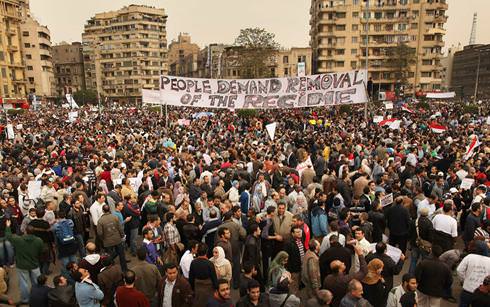 Turns out Omar Suleiman may be the only candidate opposition figures can agree on. But does that make his selection any less futile?
Turns out Omar Suleiman may be the only candidate opposition figures can agree on. But does that make his selection any less futile?A number of business and opposition representatives cycled through Friday meetings with the Egyptian government, preparing the stage for Saturday’s “Council of Wise Men.” Apparently in agreement that Suleiman, Egypt’s newly-created Vice President, will preside over the country’s transitional phase, their focus has already shifted towards constitutional battles over articles 82 and 139. This strategy makes sense, politically speaking.
Oppositional lawyers face the dilemma of freezing Egypt’s constitution by allowing Mubarak’s immediate collapse. Article 139 states that the president may appoint one or more vice presidents, "define their jurisdictions and relieve them of their posts.” Meanwhile 82 blocks these appointees from requesting constitutional amendments or dissolving the parliament or shura councils. In other words, a trap to share hollow power.
The Egyptian opposition wants to reverse roles and turn Mubarak into a figurehead, ensuring the legal transfer of his authority before he lets go. Then they can negotiate the end of Egypt’s state of emergency, future elections, lifting the ban on political parties, settling political grievances, and freeing the state-held media. Amr Hamzawy, one “wiseman” who works with the Carnegie Middle East Center in Beirut, told Al Jazeera that Mubarak has already given Suleiman "all needed presidential powers" to "manage a transition period."
"The council demands that the president hands all presidential powers to Vice President Omar Suleiman for the transitional period of power, ending with Mubarak's term," Hamzawy said.
The overriding question is whether this outcome is acceptable to the hardened core of Egyptians holding down Tahrir Square, or to the millions marching on Friday chanting “Leave, Leave, Leave.” Suleiman’s power as intelligence chief earned him an association as Mubarak’s right-hand man. And some of these “wisemen” are businessmen who, pragmatic as they may intend to be, might concern themselves more with dollars than democracy. Many reporters describing Saturday’s talks speak of a disconnect between street protesters and opposition figures.
Believing that Mubarak has no regard for the constitution - and just beaten by suspected government thugs - they may find constitutional hang-ups to be of trivial importance. The same goes for Egypt’s decaying economy, as many have been out of work for years.
As for opposition figure Mohamed ElBaradei, he has signaled a “respect” and willingness to negotiate with Suleiman, but remains non-committal on his future role. Reports have ElBaradei both considering and declining a run for president, and a transitional position may suit his relative neutrality better than a full-term. He also told reporters that a year-long transitional period is required, suggesting someone else besides one of Mubarak’s men.
The Muslim Brotherhood claims it will negotiate with Suleiman only after Mubarak is completely disposed of, surely venting at his latest allegations. Mubarak has now blamed the Muslim Brotherhood for Wednesday and Thursday’s violence: the attacks on foreign journalists, intermittent gunfire down Cairo allies, and the siege rings erected by pro-government forces on Cairo’s outer highways. Conversely, the Brotherhood reported that a security force accompanied by a "gang of thugs" stormed the office of its news website Friday and arrested everyone inside.
Perhaps Suleiman is gaining consideration because of his potential to side-line the Brotherhood, even though he extended an invite to them. Or maybe, as “wiseman” Diaa Rashwan observed, "The only way forward is for Mubarak to give up power to Suleiman. The opposition leadership is so divided that no clear option is available outside the ruling establishment.” But in any event, Suleiman’s appointment is a forced measure rather than a true expression of Egypt’s popular opposition.
Clearly Mubarak won’t turn over power to someone he doesn’t trust, an inherent contradiction to the revolution. And with Mubarak publicly rejecting an immediate transition to Suleiman, this plan is shaping up to prolong Egypt’s chaos rather than relieve it.

No comments:
Post a Comment